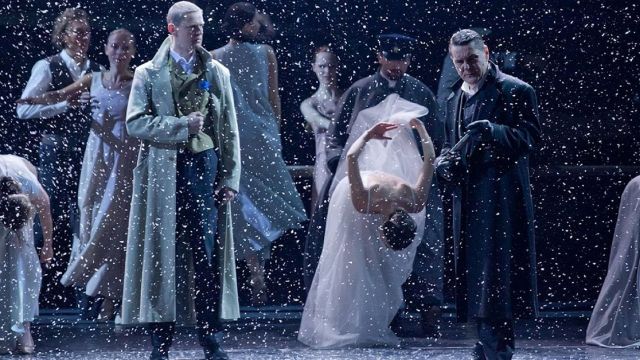Eugene Onegin
Rimas Tuminas’ celebrated production of Eugene Onegin was meant to be a headline production for the 2021 Adelaide Festival. Unfortunately, Covid-19 prevented this. Fortunately, thanks to technology, we can enjoy the next best thing.
A simultaneous broadcast meant that we could see the performance at the same time as the Russian audience in the 100-year-old Vakhtangov Theatre, except it was 7.00pm here and 11.00am there, a time normally reserved for children’s performances.
On a side note, it was interesting to see the Russian audience before the show, masked and checking their phones. We may be on the other side of the world, but some things remain the same.
Set in the 1820s, the story concerns a selfish hero who lives to regret his rejection of a young woman's love and his careless incitement of a fatal duel with his best friend.
Tuminas’ production uses selected chapters from the famous Alexander Pushkin novel (in verse) and presents them centring the story on Tatyana, featuring older and younger versions of Onegin and Lensky, and introduces the character of the Retired Hussar.
Visually, Eugene Onegin is spectacular! Snow swirls across the stage enveloping a gypsy caravan, books become birds and performers on swings dangle above the stage.
Performed in a ballet studio and dominated by a full stage mirror capable of moving back and forth, furniture and set pieces are brought in and out to represent different locations.
The younger Onegin and Lensky experience the narrative and their older versions reflect and narrate the action.
The spoken word (in verse) is punctuated with extended sections of choreographed movement, and music. A piano accordion (played by Olga-Maria Volkova) features heavily as does a domra played by the wanderer (Ekaterina Kramzina).
The two Onegins, Sergey Makovetsky (the elder) and Victor Dobronravov (the younger) exude control, dominance and regret, especially in the speech at the end of the play.
The two Lenskys, Oleg Makarov (the elder) and Vasily Simonov (the younger) are the complete antithesis; carefree, emotional and idealistic. The death scene is skilfully managed, especially his exit dragged off on a sled.
In this new version of Eugene Onegin, Tatyana is the true hero/heroine. Olga Lerman ranges from innocence to a resigned acceptance of her fate. Her physicality is amazing to watch. Dragging beds and benches around and contorting her body into difficult poses she ‘pours her heart out’ to the audience and we instantly bond with her.
Artur Ivanov’s Retired Hussar represents the common man and provides the connection between scenes.
Irina Kupchenko delivers the moving poem ‘Tatyana’s Dream’ with stillness and intensity. Lyudmila Maksakova plays multiple roles adding depth to the production and Pavel Tekhedra Kardenas as the tutor of the dancing classes embodies the Enrico Cechetti of Russian ballet.
My only reservation with this production is not a fault but a difference in cultures. There were some sections Russian audiences found amusing that did not raise a chuckle from the audience in Her Majesty’s Theatre. This was unavoidable and was more than compensated for by the sheer artistry of the production.
Alexander Pushkin is rightly considered to be the founding father of the modern Russian language. To reimagine his classic could have been a disaster, (especially to the Russian people), but this new reimagining of Eugene Onegin is a masterclass in acting.
Barry Hill
Subscribe to our E-Newsletter, buy our latest print edition or find a Performing Arts book at Book Nook.

